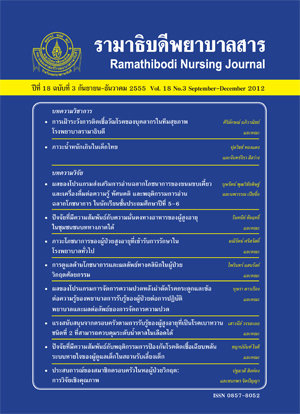ปัจจัยที่มีความสัมพันธ์กับพฤติกรรมการป้องกันโรคติดเชื้อเฉียบพลันระบบหายใจของผู้ดูแลเด็กในสถานรับเลี้ยงเด็ก
Main Article Content
Abstract
บทคัดย่อ
การวิจัยเชิงบรรยายนี้ มีวัตถุประสงค์เพื่อศึกษาความสัมพันธ์ระหว่างการรับรู้โอกาสเสี่ยงของการเกิดโรค การรับรู้ความรุนแรงของโรค การรับรู้ประโยชน์ของการปฏิบัติ การรับรู้อุปสรรคของการปฏิบัติ การได้รับข้อมูลข่าวสารกับพฤติกรรมการป้องกันโรคติดเชื้อเฉียบพลัน ระบบหายใจของผู้ดูแลเด็กในสถานรับเลี้ยงเด็ก ภายใต้กรอบทฤษฎีแบบแผนความเชื่อด้านสุขภาพของเบคเกอร์ เลือกกลุ่มตัวอย่างโดยการสุ่มแบบหลายขั้นตอน กลุ่มตัวอย่างคือ ผู้ดูแลเด็กในสถานรับเลี้ยงเด็กเอกชนในกรุงเทพมหานคร จำนวน 145 ราย เก็บรวบรวมข้อมูลโดยใช้ แบบสอบถาม ประกอบด้วย ข้อมูลส่วนบุคคล ความเชื่อด้านสุขภาพเกี่ยวกับโรคติดเชื้อ เฉียบพลันระบบหายใจ การได้รับข้อมูลข่าวสาร และพฤติกรรมการป้องกันโรคติดเชื้อเฉียบพลัน ระบบหายใจ วิเคราะห์ข้อมูลโดยใช้ค่าร้อยละ ค่าเฉลี่ย ค่าส่วนเบี่ยงเบนมาตรฐาน ค่าสัมประสิทธิ์สห สัมพันธ์แบบอันดับของสเปียร์แมน ผลการศึกษาพบว่า การรับรู้ความรุนแรงของโรค การรับรู้ประโยชน์ ของการปฏิบัติ และการได้รับข้อมูลข่าวสารมีความสัมพันธ์ทางบวกกับพฤติกรรมการป้องกัน โรคติดเชื้อเฉียบพลันระบบหายใจอย่างมีนัยสำคัญทางสถิติ ส่วนการรับรู้อุปสรรคของการปฏิบัติ มีความสัมพันธ์ทางลบกับพฤติกรรมการป้องกันโรคติดเชื้อเฉียบพลันระบบหายใจอย่างมีนัย สำคัญทางสถิติ อย่างไรก็ตาม การรับรู้โอกาสเสี่ยงของการเกิดโรคไม่มีความสัมพันธ์กับพฤติกรรม การป้องกันโรคติดเชื้อเฉียบพลันระบบหายใจทางสถิติ จากผลการศึกษาเสนอแนะว่าหน่วยงาน ที่เกี่ยวข้องควรจัดทำโปรแกรมส่งเสริมและสนับสนุนพฤติกรรมการป้องกันโรคของผู้ดูแลเด็กที่ เน้นเรื่องการเพิ่มการรับรู้ความรุนแรงของโรค การรับรู้ประโยชน์ของการปฏิบัติ การรับรู้อุปสรรค ของการปฏิบัติ และการได้รับข้อมูลข่าวสารเป็นระยะอย่างต่อเนื่อง เพื่อให้ผู้ดูแลเด็กมีพฤติกรรม การป้องกันโรคที่ดี ซึ่งจะนำไปสู่การมีสุขภาพที่ดีของเด็กในสถานรับเลี้ยงเด็กต่อไป
คำสำคัญ: โรคติดเชื้อเฉียบพลันระบบหายใจ ผู้ดูแลเด็ก พฤติกรรมการป้องกันโรค สถานรับเลี้ยงเด็ก ทฤษฎีแบบแผนความเชื่อด้านสุขภาพ
Abstract
The purpose of this descriptive, correlational research was to investigate the relationships between perceived susceptibility to disease, perceived seriousness of the disease, perceived benefits of action, perceived barriers to action, access to information, and the acute respiratory infection preventive behaviors in child care workers who worked in child care centers. The Health Belief Model was used to guide this study. The study utilized a random sample of 145 child care workers who worked in private child care centers in Bangkok Metropolitan using a multi-stage cluster sampling technique. All data were collected using the questionnaires, which composed of the Demographic Data Questionnaire, the Health Beliefs Concerning Acute Respiratory Infection Questionnaire, the Access to Information Questionnaire, and the Acute Respiratory Infection Preventive Behaviors Questionnaire. The data were analyzed using descriptive statistics and Spearman rank correlation coefficient. The results revealed that there were significantly positive correlations between the perceived seriousness of disease, the perceived benefits of action, access to information and the acute respiratory infection preventive behaviors. In addition, there was a significantly negative correlation between the perceived barriers to action and the acute respiratory infection preventive behaviors. However, there was no statistically significant correlation between the perceived susceptibility to disease and the acute respiratory infection preventive behaviors. The findings suggested that the responsible institutions should provide the health promotion and supportive programs about the acute respiratory infection preventive behaviors with emphasis on the perceived seriousness of disease, the perceived benefits of action, the perceived barriers to action, and access to information constantly in order to maintain child care workers’ preventive health behaviors, as well as enhancing levels of physical wellness of children in child care centers.
Keywords: Acute respiratory infection, Child care worker, Preventive behavior, Child care center, Health Belief Model
Article Details
บทความ ข้อมูล เนื้อหา รูปภาพ ฯลฯ ที่ได้รับการตีพิมพ์ในรามาธิบดีพยาบาลสาร ถือเป็นลิขสิทธิ์ของวารสาร หากบุคคลหรือหน่วยงานใดต้องการนำทั้งหมดหรือส่วนหนึ่งส่วนใดไปเผยแพร่หรือเพื่อกระทำการใด ใด จะต้องได้รับอนุญาตเป็นลายลักษณ์อักษรจากรามาธิบดีพยาบาลสารก่อนเท่านั้น


